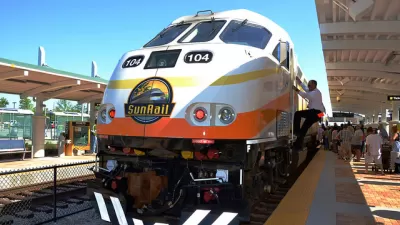Florida's SunRail commuter rail received a $93.4 grant from the Federal Transit Administration to extend the 61-mile line. The grant will cover half the capital costs for the 17.2-mile extension from Orlando to Osceola County.
The Sept. 28 ceremony in Kissimmee, Fla., where Federal Transit Administration (FTA) Acting Administrator Therese McMillan signed a Full Funding Grant Agreement for a $93.4 million federal grant, was a truly bipartisan event.
"The 17.2-mile Phase II South commuter rail line extension [PDF] will extend service from south of Orlando through Kissimmee to Poinciana in Osceola County," writes Steven Taubenkibel for FTA.
The project will improve transit service to regional employment, entertainment, cultural and retail destinations, including the Orlando Central Business District, and through transit connections to the Orlando International Airport, Disney World, SeaWorld, Universal Studios, and the Lake Nona mixed-use commercial community.
"Officials said the Full Funding Grant Agreement commits $93.4 million in funding from FTA’s Capital Investment Grant Program," writes Michael Lopardi of WFTV. "The funding amount represents roughly half of the project's $186.9 million estimated total cost. The remaining costs are covered by the state of Florida and Orange and Osceola counties."
The project will include four new commuter rail stations -- Meadow Woods in Orange County and Osceola Parkway, Kissimmee Amtrak and Poinciana in Osceola County -- the purchase of two locomotives and four passenger cars and the construction of a vehicle storage and maintenance facility
The 61-mile commuter rail line launched in 2014. The project was considered controversial in its early formation due to CSX Railroad as noted here in 2011.
"SunRail is Florida's second commuter rail system after South Florida's Tri-Rail," according to Wikipedia.
Hat tip to AASHTO Journal.
FULL STORY: FTA Announces $93.4 Million Grant Agreement to Expand Sunrail in Central Florida

Planetizen Federal Action Tracker
A weekly monitor of how Trump’s orders and actions are impacting planners and planning in America.

Maui's Vacation Rental Debate Turns Ugly
Verbal attacks, misinformation campaigns and fistfights plague a high-stakes debate to convert thousands of vacation rentals into long-term housing.

Restaurant Patios Were a Pandemic Win — Why Were They so Hard to Keep?
Social distancing requirements and changes in travel patterns prompted cities to pilot new uses for street and sidewalk space. Then it got complicated.

In California Battle of Housing vs. Environment, Housing Just Won
A new state law significantly limits the power of CEQA, an environmental review law that served as a powerful tool for blocking new development.

Boulder Eliminates Parking Minimums Citywide
Officials estimate the cost of building a single underground parking space at up to $100,000.

Orange County, Florida Adopts Largest US “Sprawl Repair” Code
The ‘Orange Code’ seeks to rectify decades of sprawl-inducing, car-oriented development.
Urban Design for Planners 1: Software Tools
This six-course series explores essential urban design concepts using open source software and equips planners with the tools they need to participate fully in the urban design process.
Planning for Universal Design
Learn the tools for implementing Universal Design in planning regulations.
Heyer Gruel & Associates PA
JM Goldson LLC
Custer County Colorado
City of Camden Redevelopment Agency
City of Astoria
Transportation Research & Education Center (TREC) at Portland State University
Jefferson Parish Government
Camden Redevelopment Agency
City of Claremont




























